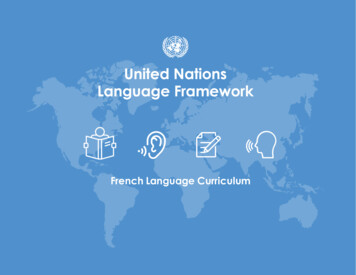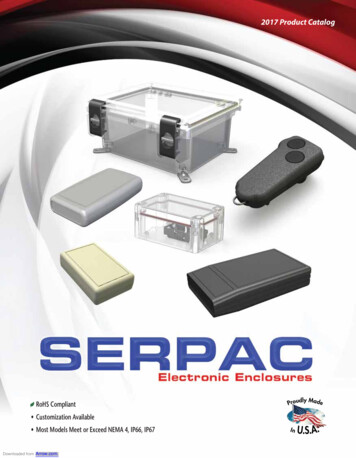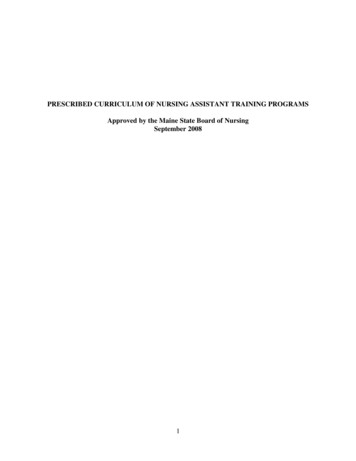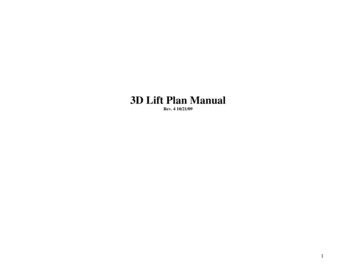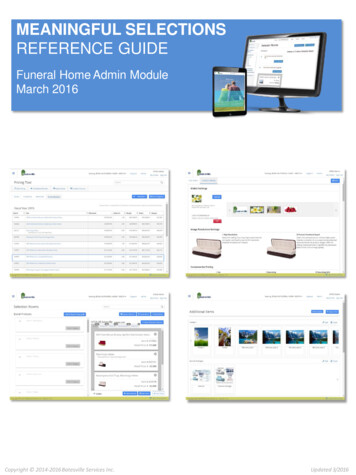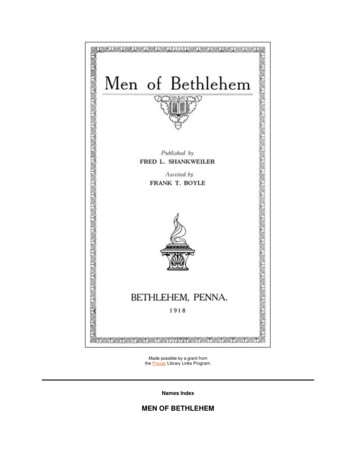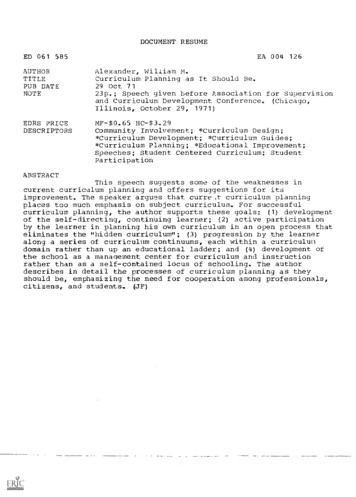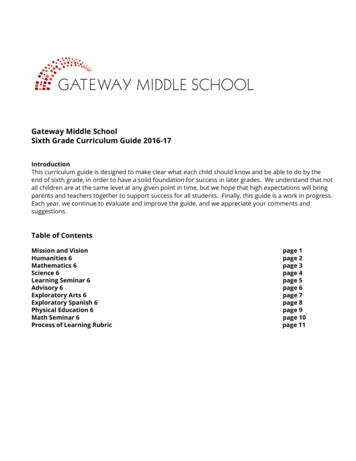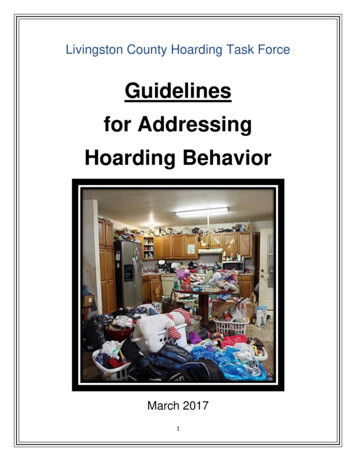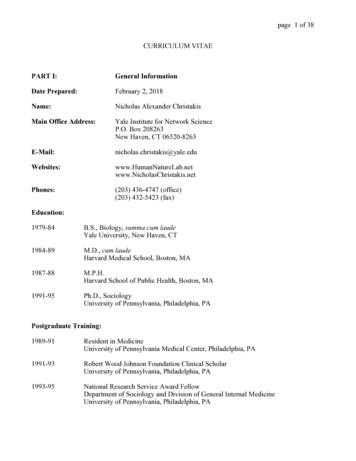
Transcription
page 1 of 38CURRICULUM VITAEPART I:General InformationDate Prepared:February 2, 2018Name:Nicholas Alexander ChristakisMain Office Address:Yale Institute for Network ScienceP.O. Box 208263New Haven, CT etPhones:(203) 436-4747 (office)(203) 432-5423 (fax)Education:1979-84B.S., Biology, summa cum laudeYale University, New Haven, CT1984-89M.D., cum laudeHarvard Medical School, Boston, MA1987-88M.P.H.Harvard School of Public Health, Boston, MA1991-95Ph.D., SociologyUniversity of Pennsylvania, Philadelphia, PAPostgraduate Training:1989-91Resident in MedicineUniversity of Pennsylvania Medical Center, Philadelphia, PA1991-93Robert Wood Johnson Foundation Clinical ScholarUniversity of Pennsylvania, Philadelphia, PA1993-95National Research Service Award FellowDepartment of Sociology and Division of General Internal MedicineUniversity of Pennsylvania, Philadelphia, PA
Nicholas A. Christakis, MD, PhD, MPHLicensure and Certification:1990199320022014Diplomate, National Board of Medical ExaminersDiplomate, American Board of Internal MedicineMassachusetts License (#212672)Connecticut License (#53536)Academic Appointments:1987-88Teaching Fellow, Department of the History of ScienceHarvard University, Cambridge, MA1990-91Assistant Instructor, Department of MedicineUniversity of Pennsylvania, Philadelphia, PA1991-94Fellow, Department of MedicineUniversity of Pennsylvania, Philadelphia, PA1994-95Instructor, Department of MedicineUniversity of Pennsylvania, Philadelphia, PA1995-98Assistant Professor of SociologyDepartment of SociologyUniversity of Chicago, Chicago, IL1995-98Assistant Professor of MedicineDepartment of MedicineUniversity of Chicago, Chicago, IL1999-01Associate Professor of SociologyDepartment of SociologyUniversity of Chicago, Chicago, IL1999-01Associate Professor of MedicineDepartment of MedicineUniversity of Chicago, Chicago, IL2001Professor of SociologyDepartment of SociologyUniversity of Chicago, Chicago, IL2001Professor of MedicineDepartment of MedicineUniversity of Chicago, Chicago, IL2001-13Professor of Medical SociologyDepartment of Health Care PolicyHarvard Medical School, Boston, MApage 2 of 38
Nicholas A. Christakis, MD, PhD, MPHpage 3 of 382005-13Professor of SociologyDepartment of SociologyHarvard University, Cambridge, MA2009-13Professor of MedicineDepartment of MedicineHarvard Medical School, Boston, MA2013-Sol Goldman Family Professor of Social and Natural ScienceDepartments of Sociology; Ecology & Evolutionary Biology; BiomedicalEngineering; and MedicineYale University, New Haven, CTClinical Appointments:1995-01Attending PhysicianUniversity of Chicago Medical Center, Chicago, IL1999-01Home Hospice PhysicianHorizon Hospice, Chicago, IL2002-06Attending Physician, Palliative Medicine ServiceMassachusetts General Hospital, Boston, MA2006-13Attending Physician, Department of MedicineMt. Auburn Hospital, Harvard Medical School, Boston, MA2013-Physician, Department of MedicineYale New Haven Hospital, New Haven, CTSelected Other Professional Positions and Visiting Appointments:1981-83Research Assistant, Laboratory of Dr. Tom ReeseMarine Biological Laboratory, Woods Hole, MA, andNINCDS, National Institutes of Health, Bethesda, MD1981-82Research Assistant, Laboratory of Dr. George PeriesInstitut de Recherches sur les Maladies du Sang,Département d’Oncologie Expérimentale, Hôpital Saint-Louis, Paris, France1995-99Core FacultyRobert Wood Johnson Clinical Scholars ProgramUniversity of Chicago, Chicago, IL1999Visiting ProfessorSydney Institute of Palliative Medicine,Royal Prince Alfred Hospital, Sydney, Australia
Nicholas A. Christakis, MD, PhD, MPHpage 4 of 382000Visiting ProfessorSydney Institute of Palliative Medicine,Royal Prince Alfred Hospital, Sydney, Australia2000Visiting FellowEdith Cowan University, Perth, Australia2001-02Visiting ProfessorCenter on Ethics and the Professions, Harvard University, Cambridge, MAMajor Administrative Responsibilities:1999-01Co-DirectorRobert Wood Johnson Foundation Clinical Scholars ProgramUniversity of Chicago, Chicago, IL2002-08Director, 2002-05; Executive Committee Member, 2005-08Robert Wood Johnson Foundation Health Policy Scholars ProgramHarvard University, Cambridge, MA2009-13Master, Pforzheimer House, Harvard CollegeHarvard University, Cambridge, MA2013-Co-Director, Yale Institute for Network ScienceYale University, New Haven, CT2015-16Master, Silliman College, Yale CollegeYale University, New Haven, CTMajor Committee Assignments (since y Search Committee, Department of Health Care Policy, Harvard MedicalSchoolFaculty Search Committee, Department of Social Medicine, Harvard Medical SchoolSteering Committee for Dana-Farber/Harvard Cancer Center PalliativeCare/Psychosocial Oncology, Harvard Medical SchoolFaculty Search Committee, Hebrew Rehabilitation Center, Harvard Medical SchoolStanding Committee on Health Policy, Harvard UniversitySteering Committee for the Institute for Quantitative Social Science, HarvardUniversityFaculty Committee, MD/PhD Program in Social Sciences, Harvard Medical SchoolFaculty Search Committee, Primary Care Division, Harvard Medical SchoolFaculty Committee, Office of Research Compliance, Harvard Medical SchoolCommittee on Promotions, Reappointments, and Appointments, Harvard MedicalSchoolFaculty Search Committee, Department of Society, Human Development, and Health,Harvard School of Public Health
Nicholas A. Christakis, MD, PhD, 1420142014-page 5 of 38Faculty Search Committee, Division of Psychosocial Oncology and Palliative Care,Dana-Farber Cancer Institute, Harvard Medical SchoolFaculty Search Committee, Department of Ambulatory Care and Prevention, HarvardMedical SchoolAdmissions Committee, Department of Sociology, Harvard UniversityJunior Faculty Search Committee, Department of Sociology, Harvard UniversityStanding Committee on Global Health, Harvard UniversitySubcommittee of Professors, Harvard Medical SchoolAdmissions Committee, Department of Sociology, Harvard UniversitySocial Science Planning Committee, Harvard UniversityFaculty Council, Harvard Medical SchoolAdmissions Committee, Department of Sociology, Harvard UniversityAdvisory Committee on Honorary Degrees, Harvard UniversityCommittee on Higher Degrees, Department of Sociology, Harvard UniversityExecutive Committee, Institution for Social and Policy Studies, Yale UniversityAdvisory Committee on Honorary Degrees, Yale UniversityDecanal Search Committee, Yale UniversityYale College Committee on Admissions and Financial AidTenure Appointments Committee for the Biological Sciences, Yale 005-1320082013Member, “Social Sciences and Population Studies” (SSPS) Study Section (formerlyknown as “SNEM-3”), National Institutes of HealthMember, National Assessors Panel for Cancer Research Grants for Australia (StudySection)Member, National Advisory Committee, Robert Wood Johnson FoundationInvestigator Awards in Health Policy ResearchMember, International Advisory Panel, Korean Longitudinal Study of Aging(KLoSA)Member, Data Monitoring Committee, Health and Retirement Survey (HRS)Member, National Institute on Aging, Behavioral and Social Research QuadrennialReview CommitteeCenter for Scientific Review, National Institutes of Health, Study Section ReviewCommitteeEditorial Responsibilities:Editorial 11Member, Editorial Board, Law, Medicine & EthicsMember, Editorial Board, IRB: A Review of Human Subjects ResearchMember, Editorial Board, Journal of Palliative MedicineMember, Editorial Board, British Medical Journal (BMJ)Associate Editor, American Journal of Sociology (AJS)Associate Editor, Palliative Medicine [UK]Ad Hoc Reviews:American Journal of Clinical Nutrition
Nicholas A. Christakis, MD, PhD, MPHpage 6 of 38American Journal of Public HealthAmerican Journal of SociologyAmerican Sociological ReviewAnnals of Internal MedicineArchives of Pediatrics and Adolescent MedicineBritish Medical JournalCirculationCulture, Medicine, and PsychiatryDemographyEconomics and Human BiologyHastings Center ReportHealth AffairsHealth Services and Outcomes Research MethodologyInformationInternational Journal of Environmental StudiesInternational Journal of EpidemiologyIRB: A Review of Human Subjects ResearchJAMA (Journal of the American Medical Association)Journal of General Internal MedicineJournal of Health EconomicsJournal of Pain and Symptom ManagementJournal of Palliative MedicineLaw, Medicine & EthicsMedical CareNatureNew England Journal of MedicineObesityOxford University PressPalliative MedicinePediatricsPopulation Research and Policy ReviewPNAS: Proceedings of the National Academy of SciencesScienceSciences Sociales et SantéSocial Science and MedicineSociological Methods and ResearchSociological MethodologyAwards and Honors:19841984198819921996Chittenden Prize, Yale University: awarded to the graduating senior majoring in thesciences who ranks highest in the classMontaigne Prize, Yale University: for excellence in FrenchBowdoin Prize, Harvard University: awarded to a graduate student for the best essayin the natural sciencesLee B. Lusted Prize, Society for Medical Decision Making: awarded to the best postdoctoral paper at the 14th Annual MeetingDigby Baltzell Prize, University of Pennsylvania: awarded for the best dissertation inSociology
Nicholas A. Christakis, MD, PhD, MPH2006200620092010201020112017page 7 of 38Distinguished Researcher Award, National Hospice and Palliative Care Organization:awarded for an “outstanding body of work contributing to the enhancement ofhospice and palliative care”Member, Institute of Medicine, National Academy of SciencesWinner, “Books for a Better Life” Award, for ConnectedRunner Up, San Francisco Book Festival Non-Fiction Prize, for ConnectedFellow, American Association for the Advancement of ScienceBest Paper of the Year, International Society for Environmental Epidemiology, for“Social Network Sensors for Early Detection of Contagious Outbreaks”Fellow, American Academy of Arts and SciencesLanguages:Fluent GreekFair French (lost fluency)Fair Spanish (lost fluency)PART II: Research, Teaching, and Clinical ContributionsFundingPast Funding (Since 1995, 042001-072002-072004-082006-08“Physician Prognostication and Decisions to Refer Terminally Ill Patients toHospice,” Project on Death in America Soros Faculty Scholar, Open SocietyInstitute (PI; 229,500)Faculty Development Trainee, Geriatric Academic Program Award, National Instituteon Aging, National Institutes of Health (K-12 AG00488), (Investigator; 164,000)“Access to Hospice Care For Alzheimer Patients at the End of Life,” Alzheimer’sAssociation, (PI; 221,806)“The Clinical Scholars Program at the University of Chicago,” Robert Wood JohnsonFoundation, (Co-Director; 2,350,249)“A Population-Based Study of the Use and the Consequences of Hospice TerminalCare in Elderly Medicare Beneficiaries,” National Institute on Aging, NationalInstitutes of Health (R-01 AG15326), (PI; 877,299)“Health in Marriage: Policy Implications of Spousal Illness and Death,” InvestigatorAward in Health Policy Research, Robert Wood Johnson Foundation, (PI; 242,990)“A Population-Based Study of the Inter-Relationship of Morbidity and MortalityBetween Elderly Spouses,” National Institute on Aging, National Institutes ofHealth (R-01 AG17548), (PI; 3,077,073)“The Health Policy Scholars Program at Harvard University,” Robert Wood JohnsonFoundation, (PI; 4,764,358)“A Social Network-Based Study of Inter-Individual Health Effects in theFramingham Heart Study,” National Institute on Aging, National Institutes ofHealth (R-01 AG24448), (PI; 2,060,986)“Psychological and Financial Burden of Cancer Caregiving in Elderly Spouses”National Institute on Aging, National Institutes of Health (R-03 AG028628), (PI; 120,000)
Nicholas A. Christakis, MD, PhD, 162011-16page 8 of 38“Dynamic Relationship of BMI and SES Over the Life Cycle and BetweenGenerations” National Heart, Lung, Blood Institute, National Institutes of Health(R-01 HL086830), (Investigator)“Development of Network Data and Methods for the Study of Health and HealthCare,” Robert Wood Johnson Foundation, Pioneer Award (PI; 653,556)“Networks and Neighborhoods,” National Institute on Aging, National Institutes ofHealth (P-01 AG031093), (PI; 11,026,363)“Roybal Center for Translational Research on Aging,” National Institute on Aging,National Institutes of Health (P-30 AG034420), (PI; 1,859,558)“Exploring the Social Contagion of Generosity,” John Templeton Foundation, (PI; 396,447)“Social Networks and Maternal Health in Honduras (Planning Grant),” Bill andMelinda Gates Foundation, (PI: 467,665)“An Open-Source Toolbox to Map Real-World Social Networks,” Robert WoodJohnson Foundation, (PI: 267,609)“Using Social Networks to Understand and Improve Health,” Robert Wood JohnsonFoundation, Pioneer Award (PI; 2,827,420)Current al Influence in Networks to Magnify Population-Level MNCH BehaviorChange),” Bill and Melinda Gates Foundation, (PI: 6,200,000)“Roybal Center for Social Networks and Well-Being,” National Institute on Aging,National Institutes of Health (P-30 AG034420), (PI; 1,631,579)“YINS-TATA Research and Knowledge Sharing Collaboration,” Tata Group, (PI; 7,500,000)“Wholesale Innovation Through Innovative Social Science (WITNESS),” DARPA,(sub-contract PI; 642,253)“International Technology Alliance (ITA),” DARPA, (Investigator; 1,370,070)TeachingFull Courses Offered (Past Ten Years):“Networks and Health,” Management 874, Yale University: This graduate course explores new researchand applications in network science, with an emphasis on health-related examples. The materialcovered equip students to analyze problems in public health, global health, and medicine, and to beleaders of companies, entrepreneurial efforts, and policy-making related to health and health care.Offered in: 2016-17“Network Interventions,” Management 573, Yale University: This graduate course explores influentialand cutting-edge research related to network science, and equips students with tools to analyzeproblems related to phenomena as diverse as: product marketing, sustainability initiatives,financial market contagions, team assembly and performance, firm mergers, demand forecasting,and the spread of violence or infection or rumors, etc. Offered in: 2016-17“Health of the Public: Medicine and Disease in Social Context,” Sociology 126, Yale University: Thisundergraduate course examines the social causes and context of illness, death, and health care inthe U.S. today. Who stays healthy and who falls ill? Who has a long life and who has a short one?What is a good death and why do so few Americans achieve it? What is good medical care and
Nicholas A. Christakis, MD, PhD, MPHpage 9 of 38who gets it? What role do physicians play in producing health in our society? Do certain kinds ofsocial networks or neighborhoods improve health? Overall, the course evaluates the collectiveconstraints on individuals’ life prospects. Offered in: 2012-13, 2013-14, 2014-15“Biosocial Science,” Sociology 636b, Yale University: This graduate seminar covers topics at theintersection of the natural and social sciences, including behavior genetics, gene-environmentinteractions, and social epigenetics. We will in particular focus on the ways in which our genes arein a (short and long) conversation with our social environment. To what extent does our geneticmakeup influence our behaviors? To what extent do our genes increase or decrease our risk forillness given particular environmental exposures? What are the biological bases of resilience?And, conversely, how does the social environment come to regulate our genome? How do socialexposures reshape neural and endocrine processes? How do social exposures “get under ourskin”? How are they literally embodied? Offered in: 2013-14, 2014-15“Big Ideas,” College Seminar CSYC 295, Yale University: This undergraduate course introducesstudents to the world’s most important ideas and disciplines. It is the conceit of this course thatthere are precious few important ideas that have relevance beyond their specific disciplines, but itis these very ideas that comprise the sine qua non of a modern education. A wide range of subjectsare covered including Psychology, Economics, Biomedicine, Linguistics, Philosophy, Physics,Sociology, and more. Offered in 2013-14“Life and Death in the U.S.A.: Medicine and Disease in Social Context,” Sociology 190, HarvardUniversity: This undergraduate course examines the social causes and context of illness, death,and health care in the U.S. today. Who stays healthy and who falls ill? Who has a long life andwho has a short one? What is a good death and why do so few Americans achieve it? What isgood medical care and who gets it? What role do physicians play in producing health in oursociety? Do certain kinds of social networks or neighborhoods improve health? Overall, thecourse evaluates the collective constraints on individuals’ life prospects. Offered in: 2005-06,2006-07, 2007-08, 2008-09, 2010-11, 2011-12, 2012-13“Methods in Medical Education Research,” Harvard Medical School. This year-long course consistedof ten instructional hours given to physician fellows interested in acquiring skills in medicaleducation research. Offered in: 2006-07, 2007-08, 2009-10, 2010-11, and 2011-2012.“Big Ideas,” Freshman Seminar 27e, Harvard University: This undergraduate course introduces studentsto the world’s most important ideas and disciplines. It is the conceit of this course that there areprecious few important ideas that have relevance beyond their specific disciplines, but it is thesevery ideas that comprise the sine qua non of a modern education. A wide range of subjects arecovered including Psychology, Economics, Biomedicine, Linguistics, Philosophy, Physics,Sociology, and more. Offered in 2011-12“Health and Social Structure,” Sociology 390, Harvard University: This graduate seminar courseconsiders cutting-edge developments in the areas of network science, medical sociology, anddemography, with an emphasis on the role of networks and neighborhoods in health and healthcare. Offered in: 2007-08, 2008-09, 2009-10, 2010-11, 2011-12, 2012-2013“Sociological Research Design,” Sociology 201, Harvard University: This graduate course guidesstudents through the process of producing an original research paper of high quality. Readings anddiscussion cover the identification of appropriate research problems, the nature of causalreasoning, and data analysis and write-up. Co-taught. Offered in: 2005-06, 2006-07
Nicholas A. Christakis, MD, PhD, MPHpage 10 of 38Current and Recent Commercial AffiliationsGallupActivate NetworksDitto LabsWhoopOnCorpsVirgin PulseSenior ScientistFounder, Member of the Board of DirectorsMember, Scientific Advisory BoardMember, Scientific Advisory BoardScientific AdvisorMember, Scientific Advisory BoardInvited Presentations (Since 1999, 2000200020002000“Health Services Research in Palliative Care in the United States,” Sydney Instituteof Palliative Medicine, Royal Prince Alfred Hospital, Sydney, Australia“Health Services Research in Palliative Care in the United States,” Canberra Hospital,Canberra, Australia“The Extent and Determinants of Accuracy in Physicians’ Prognoses When Patientsare Referred to Hospice,” and “Patient Survival After Enrollment in Hospice,”Keynote Addresses, Minnesota Hospice Organization Conference, Bloomington,MN“Some Insights into Physician Anxiety,” Society and Medicine: Explorations of TheirMoral and Spiritual Dimensions, A Festschrift Conference in Honor of Renée C.Fox, Philadelphia, PA“A Series of Projects on the Determinants of the Timing of Hospice Enrollment,” “AnIntroduction to Survey Methods for Health Services Research in PalliativeMedicine,” and “An Introduction to Case/Control and Cohort Methods for HealthServices Research in Palliative Medicine,” Workshop on The Care of Patientswith Advanced and Progressive Disease: Research and Research Methodology,Royal Prince Alfred Hospital, Sydney, Australia“Death Foretold: Some Aspects of Prognostication in Clinical End-of-Life Care,”Sydney Institute of Palliative Medicine, Royal Prince Alfred Hospital, Sydney,Australia“Death Foretold: Prognosis in Cancer Care,” Department of Epidemiology, MonashUniversity, Melbourne, Australia“The Accuracy of Physicians’ Prognoses in Cancer Care,” Anti-Cancer Council ofVictoria, Melbourne, Australia“The Extent and Determinants of Error in Doctors’ Prognoses for Terminally IllPatients: A Prospective Study,” Grand Rounds, Sir Charles Gairdner Hospital,Perth, Australia“Death Foretold: Prophecy and Prognosis in Medical Care,” Western AustraliaCouncil for Palliative Care, Perth, Australia“Death Foretold: Prophecy and Prognosis in Medical Care,” Institution for Social andPolicy Studies, Yale University, New Haven, CT“The Extent and Determinants of Error in Physicians’ Prognoses in Terminally IllPatients,” Grand Rounds, Cook County Hospital, Chicago, IL“Death Foretold: Prophecy and Prognosis in Medical Care,” Leonard Davis Institute,University of Pennsylvania, Philadelphia, PA“Barriers to the Use of Hospice Care at the End of Life,” testimony before the UnitedStates Senate, Special Committee on Aging, Washington, DC
Nicholas A. Christakis, MD, PhD, 320032003200420042004200420042004200420042004page 11 of 38“‘How Long Do I Have to Live?’ -- Why Prognostic Questions Trouble Doctors,”Keynote Address, Midwest Society of General Internal Medicine Annual Meeting“‘How Long Do I Have to Live?’ -- Why Prognostic Questions Trouble Doctors,”The Medical Center Hour, University of Virginia, Charlottesville, VA“The Transition to Hospice Care in Seriously Ill Elderly Patients,” Department ofHealth Care Policy, Harvard Medical School, Boston, MA“Nice Help If You Can Get It: Inter-Spousal Support, Gender, Medicine, and Death,”Notestein Seminar, Population Research Center, Princeton University, Princeton,NJ“The Practical Predicament of Prognostication at the End of Life,” Plenary KeynoteAddress, 7th International Meeting of the European Association for PalliativeCare, Palermo, Italy“Nice Help If You Can Get It: Inter-Spousal Support, Gender, Medicine, and Death”The Frances H. Schiltz Lecture, University of Kansas School of Medicine,Wichita, KS“‘How Long Do I Have to Live?’ -- Why Prognostic Questions Trouble Doctors,”Johns Hopkins University Medical School, Baltimore, MD“Nice Help if You Can Get It: Inter-Spousal Support, Gender, Medicine, and Death,”Medical University of South Carolina, Charleston, SC“‘How Long Do I Have to Live?’ -- Why Prognostic Questions Trouble Doctors,”Grand Rounds, University of Pennsylvania Medical Center“Some Comments on Inter-ethnic Variation in Schizophrenia and Suicide Rates,”Jacobs Foundation Conference, Marbach Castle, Germany“Foreseeing and Foretelling a Good Death,” Public Lecture, King’s College, London,England“Death Foretold: Epidemiological and Sociological Studies of Whether and HowPhysicians Prognosticate,” McGill University, Montreal, Canada“‘How Long Do I Have to Live?’ -- Why Prognostic Questions Trouble Doctors,”Grand Rounds, Department of Medicine, Brigham and Women’s Hospital,Boston, MA“The Health of Migrants,” Conference on African Migration and Urbanization inComparative Perspective, Johannesburg, South Africa“The Health Impact on Families of Health Care: A Matched Cohort Study of HospiceUse by Decedents and Mortality Outcomes in Surviving, Widowed Spouses,”Grand Rounds, Hygeia Hospital, Athens, Greece“‘How Long Do I Have to Live?’ -- Why Prognostic Questions Trouble Doctors,”Magdalen College, Oxford University, Oxford, UK“Physicians’ Responses to Prognostic Error,” European Association of PalliativeCare, Conference held in Milan, Italy“The Effect of Disabling Illness or Death in One Spouse on the Mortality of theOther,” NBER Conference on Disability in the U.S., Charleston, SC“‘Cascade’ Effects with Respect to Health and Health Care in Social Networks,”University of Maryland Population Research Center, College Park, MD“‘How Long Do I Have to Live?’ -- Why Prognostic Questions Trouble Doctors,”Grand Rounds, Lahey Clinic, Burlington, MA“Hospice Care, The Widower Effect, and Social Networks at the End of Life,”National Advisory Council on Aging, NIH, Bethesda, MD“Health Externalities of Illness and Medical Care Near the End of Life,” The Institutefor Fiscal Studies, University College, London, UK“Using CMS Data to Examine the Determinants and Outcomes of End-of-Life Care,”Centers for Medicare and Medicaid Services, Baltimore, MD
Nicholas A. Christakis, MD, PhD, 520052005200520052006200620062006200720072007page 12 of 38“Inter-Spousal Mortality Effects: Caregiver Burden Across the Spectrum of DisablingDisease,” NBER Conference on Disability in the U.S., Jackson Hole, WY“Inter-Spousal Mortality Effects: Caregiver Burden Across the Spectrum of DisablingDisease,” Royal Prince Alfred Hospital, University of Sydney, Sydney, Australia“Inter-Spousal Health Effects of Illness and Medical Care in the Elderly Near the Endof Life,” New South Wales Society for Palliative Medicine and Sydney Instituteof Palliative Medicine, Sydney, Australia“Health Impact of Health Care on Surviving Family of Cancer Patients,” ClinicalOncological Society of Australia (COSA) Annual Meeting, Canberra, Australia“‘How Long Do I Have to Live?’ -- Why Prognostic Questions Trouble Doctors,”Clinical Oncological Society of Australia (COSA) Annual Meeting, Canberra,Australia“Social Aspects of Dignity at the End of Life,” University of Tasmania, Hobart,Australia“Uncertainty and Dread Regarding Prognosis Among Physicians,” Luso-AmericanFoundation, Lisbon, Portugal“The Health Impact of Health Care on Family Members of Seriously Ill Patients,”Aghia Sophia Children’s Hospital, Athens, Greece“Staying Healthy for Your Partner’s Sake,” Keynote Address, Hellenic-AmericanMedical Society and the Harvard Club of Greece, Athens, Greece“Health Externalities: How Illness and Health Care in One Spouse Affect the Survivalof the Other,” RAND Corporation, Los Angeles, CA“Health Externalities: How Illness and Health Care in One Spouse Affect the Survivalof the Other,” Duke University, Durham, NC“The Epidemiological Study of Intra-Familial Health Effects: Spousal Hospitalizationand Partner Mortality,” University of Athens, Athens, Greece“Prognostication and Palliative Care,” Lisbon Faculty of Medicine, Lisbon, Portugal“The Health Effects of End-of-Life Care on Spouses: Revisiting the Widower Effectand Caregiver Burden,” Lisbon Faculty of Medicine, Lisbon, Portugal“The Science and Art of Prognosis Near the End of Life: Implications for Patients,Doctors, and Society,” Annual Opening Lecture of the Academic Year, LisbonFaculty of Medicine, Lisbon, Portugal“Health Externalities: How Illness and Health Care in One Spouse Affect the Survivalof the Other,” Davis Lecture, University of Chicago, Chicago, IL“The Possible Effects of Pain and Pain Relief on Family Members,” University ofBristol, Bristol, UK“The Role of Prognosis in Clinical Care,” Zuckerman Lecture, Mt. Auburn Hospital,Cambridge, MA“Inter-Personal Health Effects in Dyadic and Hyper-Dyadic Social Networks,”Harvard School of Public Health, Boston, MA“How Illness and Health Care in One Spouse Affect the Survival of the Other,”Internationally Distinguished Speaker Series, Cleveland Clinic Foundation,Cleveland, OH“The Epidemic Spread of Health Behavior in a Complex, Longitudinally ResolvedSocial Network,” Condensed Matter Seminar, Department of Physics, Universityof Notre Dame, South Bend, IN“The Epidemic Spread of Obesity in a Large Social Network Over 32 Years,”Kennedy School of Government, Harvard University, Cambridge, MA“The Spread of Obesity in a Large Social Network Over 32 Years,” Human NutritionResearch Center, Tufts University, Boston, MA
Nicholas A. Christakis, MD, PhD, 820082008200820082008200820082008page 13 of 38“Inter-Personal Health Effects: The Spread of Health Behaviors in Social Networks,”Harvard Program on Asian and International Relations Annual Meeting, Beijing,China“Inter-Personal Health Effects and Social Inequality,” Harvard Program on Asian andInternational Relations Annual Meeting, Beijing, China“Reflections on the Media Coverage of ‘The Spread of Obesity,’” College ofCommunication, Boston University, Boston, MA“The Spread of Health Behaviors in Social Networks,” National Advisory Council onAging, NIH, Bethesda, MD“The Spread of Obesity and Health Behaviors in a Complex, Longitudinally ResolvedSocial Network,” Plenary Address, International Conference on Complex Systems(ICCS 2007), Boston, MA“The Spread of Health Phenomena Within Complex Social Networks,” Center forHealth Equity Studies, Stockholm University, Stockholm, Sweden“Some Thoughts on the Rise of Social Science Data Complexity,” Meeting onComputational Social Science, Harvard University, Cambridge, MA“Eat, Drink, and Be Merry: The Spread of Health Phenomena in Social Networks,”Department of Epidemiology, Harvard School of Public Health, Boston, MA“Eat, Drink, and Be Merry: The Spread of Health Phenomena in Social Networks,”Institute for Social and Economic Research and Policy, Columbia University,New York, NY“The Spread of Health Phenomena in Complex Social Networks,” Center forStatistical Sciences, Brown Universi
1981-82 Research Assistant, Laboratory of Dr. George Peries Institut de Recherches sur les Maladies du Sang, Département d'Oncologie Expérimentale, Hôpital Saint-Louis, Paris, France 1995-99 Core Faculty Robert Wood Johnson Clinical Scholars Program University of Chicago, Chicago, IL 1999 Visiting Professor
